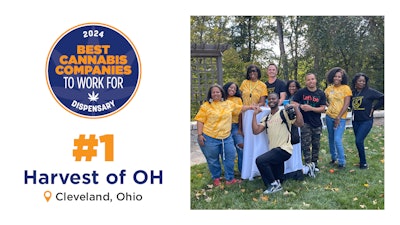
Harvest of Ohio is a family- and Black-owned business led by CEO Ariane Kirkpatrick, Kirkpatrick’s sister and the company’s Chief Operating Officer Amonica Davis, and several other family members who help steer the vertically integrated medical cannabis and soon-to-be adult-use operation.
Director of Marketing Keya Kellum says family values are at the core of the business, with honesty and transparency at the forefront.
“A lot of companies say that they're family-oriented and [have a] family mindset, but I've never worked for a company until now that they actually mean it [and it] actually does feel like I'm working with family,” Kellum says. “There are ups and downs with that, with working with your family, and I love that, with this company, we're very open and honest about those [challenges]. Transparency is about those ins and outs, about the ups and downs, and I think that's what makes us the best company to work for is, overall, we're honest. We're going to be very genuine. We're going to be real. We're going to let you know what's going on. And sometimes it's not always pretty, but we're in it together because we are a family company and that doesn't just mean we have to have the same blood. It just means we have the same values.”
Here, Kirkpatrick, Kellum and Chief People Officer Nicole McKinney-Johnson share more about the Ohio-based operation and how it supports its employees.
On most important or telling interview questions:
Nicole McKinney-Johnson: When it comes to our new hires, we want to start with their experience. What I've learned in this space, especially with cannabis, [is] 90% of our employees either use the product or their family members [do]. Getting to know their story is the most important. There are so many employees that have family members that have been removed from pharmaceutical drugs, and they use cannabis and they've made remarkable strides as it relates to their health and wellness. So, my first question to any employee is, why us? What drew you to our organization? What has cannabis done for you in your community, for yourself, for your family? We start there because anything from an employer lens as it relates to training and development, all of those things are coachable and learnable, but it's really about your heart and your soul and what your impact [is] to the organization. So, I start with the story.
On improvements to onboarding and training:
Keya Kellum: We have a brand ambassador program. When we kickstarted that, we had onboarding, and after our onboarding and even continuing into the coming weeks, we have one-on-ones with all of our brand ambassadors. That way, they're not only in a setting where we are learning together, but they get one-on-one time with myself and the brand ambassador manager to ask any questions that they may not feel comfortable asking in a group setting. I've found that that's been beneficial because it allows them to put their guard down and be able to ask any question they want. A lot of times there are questions in those one-on-ones that I can just go ahead and circle back to when we're in a group setting because nine times out of 10, if it was asked in a one-on-one, somebody else has that same thought as well.
McKinney-Johnson: We don't want HR to be considered the big bad wolf. We want to have a soft space and a safe landing for every employee to have the opportunity to talk to [his or her] manager [or] shift supervisor in a space where they can feel empowered and educated. We want to ensure that they're listened to, that they're heard, and that we can give them the tools to be successful.
Ariane Kirkpatrick: Nicole goes to all of our sites, sometimes twice a month, and she spends time with the team where she's very approachable. [The employees] felt very comfortable speaking directly with Nicole because she lets them know, “Hey, I'm an open door.” I think it's pretty phenomenal, and the team members absolutely love that.
On developing mentorship opportunities for the team:
Kellum: Like Ariane says, she's always in the stores. She likes to be a part of the entire process. And from that, she was able to see some of the cracks that we had in our flow. That's how the brand ambassador program was [born]. How that works is, they've reached out to someone who they've identified could be a mentor or a department they want to be a part of. A lot of times, it's marketing. The brand ambassador program is an intro to HR, marketing, and all things communications. Not only do they learn the basics of marketing, but a lot of times in our sessions we're teaching them about social media, we're teaching them about advertising—things that they had no clue even was a part of their job description, but now they're getting to grow into that field. So, it's more than just greeting a patient when you walk in. It's you taking on these tools and these skills for you to continue to elevate, whether it's with our company or another company.
McKinney-Johnson: One of the things that we really value here is to bloom where you’re planted. We had an employee come in, work in one department, find out that her strengths were in another department, and [she] was able to recognize that, and now she's working under another director. She's flourishing, and she's able to utilize her degree. Once you get here, it is a great place to be able to foster different types of relationships and personal development.
Kellum: We like to put people in positions that make sense for them, and if it doesn't work out, figure out other game plans for them as opposed to just writing it off and having them go to another company.
On performance reviews and giving employees feedback:
McKinney-Johnson: Our executive leadership team [has] weekly meetings with everyone giving us the opportunity to collaborate with one another through departments and see how everyone is doing. Then, from our management level, there are always meetings for different areas of the business as it relates to how the business is doing, how your team is doing, and then how you are doing and how we can help and empower you to make sure that you're the best, well-rounded manager that you can be. We have 60-day and one-year performance reviews, and then one of the responsibilities that we have as a department is to ensure that we provide the tools and the training based on the needs of the employee.
Kellum: With those performance reviews, what I really like is the fact that we give the opportunity for our employees to review themselves. The few companies that I worked at before, it was never that. It was always, “This is how you're doing from our vantage point, now take it and be better.” But no, at Harvest, we like to give the employees the opportunity to rate themselves. With my direct [supervisor], I was able to take a step back and look at each category and really compare it to what she thought. Not only was she letting me know what she thought, but we got to work together. We collaborated together in order to come to what we thought made the most sense.
On promoting a healthy work-life balance and prioritizing wellbeing beyond the workplace:
McKinney-Johnson: The work-life balance is key here. Unlike a lot of employers, when you first walk in the door and you're a full-time employee, you get two weeks of vacation—paid time off. And that's unheard of in any type of industry, especially retail. We even police some of their schedules because it's like, “OK, you're working three weekends in a row. When are you going to spend some time with your family? What's going on?” They're taken aback by our transparency as it relates to ensuring that they have this type of balance. We encourage them to get together off-site and have get-togethers with their families. Our CEO and COO are very generous in even helping with some of the costs concerning that.
We celebrate when people do things. We are very intentional because we understand that when you feel better is when you work better. We are producing a product and a lane for our patients, and if we're not our best self, then how can we make sure to promote the wellness of others through the products that we sell? We have an EAP—an employee assistance program—that does everything from nutrition to financial wellness, cooking classes, therapy sessions, and it's offered to the employee and everyone in [his or her] household for free.
On unique or important benefits offered to employees:
McKinney-Johnson: We encourage them to go visit the local Chamber of Commerce meetings, anything that's dealing with cannabis. In Columbus, [Ohio,] we just had a meeting last week where we provided a link so anyone can listen in and learn more about what's going on in the industry and the policies concerning that. We have town hall meetings that we've done where we've had symposiums and speakers talk about cannabis and uniting small, Black-owned businesses and women-owned businesses. We invite our employees to be a part of that, to give them that opportunity to meet other people in the industry.
Kellum: One of the employees’ favorite benefits that we have in our retail stores—we use SparkPlug, which is essentially a platform that allows you to gain more money based on your sales. So, if I sell 10 jars, I get an additional $50 or whatever the sale is for that day. Our employees love it so much because we haven't capped it. So, we don't say, “OK, once you get to $100, you’ve got to stop.” No, as much as you sell is as much as you get back. They really appreciate that.
In addition to that, we do have a bonus structure monthly with our sales goals. When we hit our goals, we get additional income, as well.
On encouraging transparency and employee feedback:
Kellum: We are transitioning from Harvest to Mavuno, and that's a great example of our transparency because we've had to communicate with our employees what's happening with the rebrand. In the last two weeks or so [in January], we've had countless meetings with the entire staff where they're just updating us on what's happening with our rebrand: Why are we rebranding and what does that mean for everyone? I think that our team does a really good job at not only communicating but communicating effectively. After all of these meetings, everyone makes themselves available for questions. Employees, including myself, feel like we can not only ask anything we want, but we'll get the answer that we deserve.
On talking about industry challenges and sharing company financials:
Kirkpatrick: We have the system Metrc that shows the sales that we make each day. It's no secret. That email goes out every single day to all team members at that store location and all the management team.
Kellum: I'm not a numbers girl, so when those emails first started to send out, I was like, “OK, what does this mean?” It forced me to have to learn, and not only am I learning that, our retail [team] is learning that [and] our brand ambassadors are learning that because they all have access to that information.
Some of the information that's on there also includes who our top seller was [and] what our top brand for that day was. It's really nice to be able to see transparently what's happening in the day-to-day. And they're transparent, too. Sometimes the GMs will say, “Today was a really slow day. I don't know if it's because it was rainy or because OSU [Ohio State University’s football team] lost, but either way, we only made X amount, so let's try to pick up the pace the rest of the week.”
On inspiration for creating a great place to work and an engaged workforce:
Kirkpatrick: Empowerment. I empower this team to go at it to do the remarkable, to do the impossible, to be creative. We have come up with our five Ps, and that is our mantra, our vision. Our five Ps are our people, product, process, passion and profit. Empowerment is the key to what we are here: engage, enlighten, empower.
On celebrating major milestones, and providing opportunities for the team to connect outside of work:
McKinney-Johnson: We work hard and play harder. That's one of our CEO's missions for us. There are always opportunities—birthdays, anniversaries—we always celebrate those. We ask our general managers to have get-togethers with their employees, bowling parties. They've had sip and paints. They encourage each other to go to each other's kids’ stuff—basketball games, baseball games, baby showers. We had a baby shower in April—the first Harvest baby. We also have a huge summer jam where our CEO pays for everything. We've had it at a country club [and] we've had it at a park where all the employees from our cultivation as well as our dispensaries get together. And we just have a really good time.
Kirkpatrick: We have one employee here, Jazmine [Couch], and I crack up all the time because I just look at her and say, “Your only role here is just to spend my money.” She is the employee engagement officer. She comes to us every month. “I'm sending everybody $50 gift cards for Thanksgiving [and] Christmas. I'm giving everybody free merchandise. I'm giving them a bowling party.” Every month, [I have] lunch sent to the locations. And the funny part is that's the norm. That's a line item in our budget that sees no cuts.
Kellum: I think one of my favorites, too, is we celebrate all holidays, even if the entire staff can't come. The marketing department, we like to make sure that we highlight all of the holidays, whether it's Kwanzaa, Hanukkah, Pride Month, St. Patrick's Day, Valentine's Day.
We always have activations in the stores where at least one person from the executive team will try to come to one of the retail stores and do a Valentine's Day game with them, or we auction something off, or we're all wearing our favorite [team gear] for the Super Bowl. We’re really trying to get creative with the virtual world, too, whether that means we hold something virtually online or we're all in Columbus, Athens or Beavercreek [where the dispensaries are located].
Editor’s note: This interview has been edited for style, length and clarity.
























